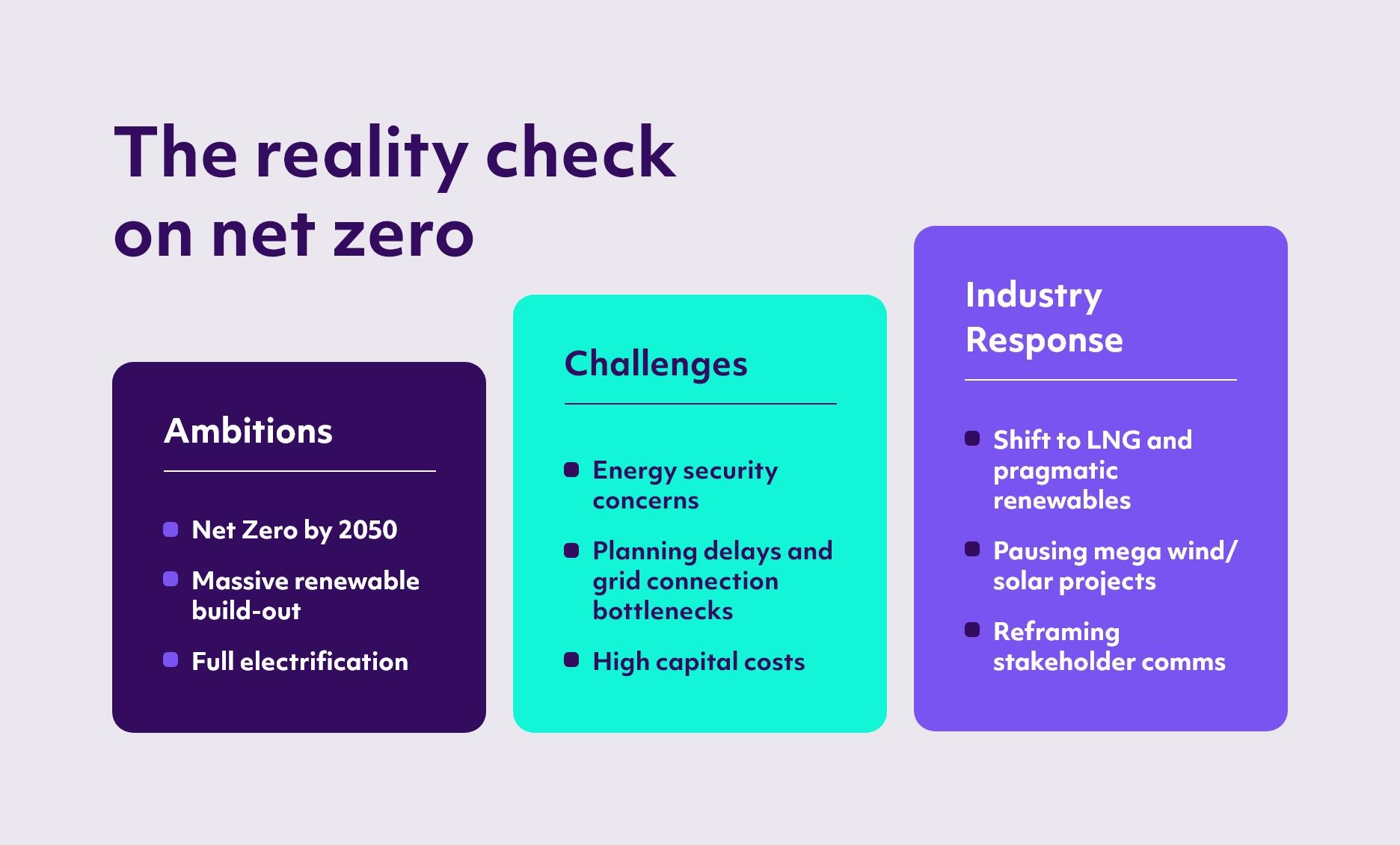7 min read
No one doubts that Donald J Trump knows how to be disruptive. His vow, in his inaugural address, to “drill baby, drill” has widely been seen as the rallying call for the end of net zero ambitions and global decarbonisation as we know it.
But, as with most of Trump’s utterances, the conundrum is whether to take his statements literally or even seriously. Was it an actual statement of policy? Or was the POTUS indulging in his own version of ‘fake news’ to energise the MAGA base and upset the liberals?
It’s worth examining the underlying contention as the reaction to it poses three fundamental questions for the energy sector:
- Is hydrocarbon production genuinely poised to increase dramatically?
- Are we really on the cusp of abandoning climate goals and Net Zero or merely taking a reality check?
- Are energy companies responding effectively to the powerful reputational impacts of this shift in perceptions?

Will hydrocarbon production increase dramatically?
Certainly, the Trump administration has been in full ‘move fast and break things’ mode in the energy sector. In a whirlwind first few weeks it pulled the USA out of the Paris Climate Accord, repealed oil drilling bans, delayed windfarm permits and declared a national fuel emergency.
However, over the last few years, US oil and gas companies have been steadily cut their drilling budgets, even during periods of comparatively high oil prices. For all the hype, there are few indications that oil investment and output is set to grow. Oil majors are doubling down on capital discipline, lay-offs, boosting productivity and improving shareholder returns, rather than drilling more.
The International Energy Agency predicts that global demand for oil and gas will peak before 2030 while remaining a key part of the energy mix past 2050. It isn’t alone. At the recent CeraWeek conference in Houston, US oil company CEOs agreed that oil production would plateau before 2030.
Is Net Zero being abandoned or just approached pragmatically?
Recent headlines paint a dismal picture of Net Zero intentions: Shell has just taken a near $1 billion hit to walk away from its investment in a New Jersey offshore windfarm while BP has been retreating from the ambitious climate targets set by former CEO Bernard Looney.

BP is retreating from ambitious climate targets set by former CEO
However, BP insists that it is still committed to the energy transition but is just trying to be smarter about it, focusing less on uncertain, capital intensive projects like windfarms and solar farms. Shell says it is concentrating on areas such as liquefied natural gas (LNG) that are “critical” for the energy transition.
In a sense, it can be argued that they are doing what they do best as oil and gas companies and leaving the development of renewables to the companies that are true leaders in that sector such as Denmark’s Ørsted and Spain’s Iberdrola (owner of ScottishPower), and the UK’s own SSE.
Given that renewables alone cannot currently replace fossil fuels at scale, and the huge focus on energy security caused by geopolitical instability, this could be considered pragmatic.
"The low carbon energy system will rely on oil and gas for the foreseeable future: the responsible approach is to make that work."
What are the key communication and policy challenges?
When corporate strategy changes, the communication strategy needs to change, too. It is vital for energy companies to get it right and take their stakeholders with them by being open, honest and accountable. Here we assess the key tasks for major players:
Revisit the viability and desirability of renewable projects
Energy developers are urgently reviewing their participation in renewable projects in the face of rising costs, planning delays, policy confusion and a dysfunctional power grid queue.
For energy developers in the UK, the long and increasingly acrimonious debate on zonal pricing is a good example of an area where clarity is urgently needed to assess the viability of projects . Advocates of zonal pricing want the UK electricity market to be divided into regions with electricity prices set by local supply and demand. They say this will bring down costs, save money and benefit consumers.
For energy developers in the UK, the long and increasingly acrimonious debate on zonal pricing is a good example of an area where clarity is urgently needed to assess the viability of projects . Advocates of zonal pricing want the UK electricity market to be divided into regions with electricity prices set by local supply and demand. They say this will bring down costs, save money and benefit consumers.
The year in which global oil demand is projected to peak before*
2030
*International Energy Agency + CeraWeek CEO sentiment
Beware of legal and financial risks
Many companies have integrated their Net Zero targets into their long-term strategies, investor communications, and even their business contracts. Abandoning these pledges can lead to all sorts of unforeseen and unpleasant consequences. Legally, they are opening the door to everything from shareholder and contractual disputes to regulatory fines and litigation over greenwashing claims.
Financially, the risks include diminished investor trust, especially among the ESG and sustainability focused fund managers. While some fund managers are also rowing back on their Net Zero ambitions, others may be compelled to divest holdings, depressing the share price and compromising ability to raise capital in future.
BP is a case in point. It has the support of hedge fund Elliot Management, which recently took a 5% stake in the company and has been instrumental in its new direction. But it must also engage with nearly 50 other sceptical institutional shareholders, led by Royal London and Scottish Widows, who are concerned about fossil fuel expansion.
Last year’s game-changing UK Supreme Court ruling in the so-called Finch case is having huge reverberations through the energy industry. The judges ruled, in effect, that any new fossil fuel project in the UK must take account of all emissions. That means those caused by burning the fuel (Scope 3) and not just those created in getting the oil or gas out of the ground (Scope 1 and 2).
The Finch ruling was cited by the Scottish Court of Session in February when it quashed UK government consents for the Jackdaw and Rosebank oil and gas fields in the North Sea.
The legal and financial risks of backtracking
Greenwashing lawsuits
Shareholder unrest
ESG fund divestment
Reputational damage
Scope 3 emission rulings
Scrutiny from regulators
Give clarity to stakeholders on the implications of revising your corporate Net Zero commitments
Energy companies must address multiple audiences ranging from employees, customers, consumers and suppliers to shareholders, regulators, NGOs, climate activists and the government.
For example, many BP employees who were inspired by the Looney-era pledges to “reimagine energy for people and our planet” will be disaffected by the rapid pivot to fossil fuel. There is a real danger that morale, recruitment and retention, and productivity will be adversely affected if not addressed as a matter of priority.
Above all, energy companies should emphasise the pragmatic nature of their approach to energy transition that seeks to balance energy security, energy affordability and sustainability. Audiences may not be aware that current net zero transition plans are unrealistic and rely too heavily on renewable alternatives that are far from achieving critical mass for society’s needs.
Summary:
Achieve balance
In any assessment of the future of their net zero policies, it’s important for energy companies to emphasise economic reality and energy security. The low carbon energy system will rely on oil and gas for the foreseeable future: the responsible approach is to make that work; not to carp from the side-lines while remaining in denial about the consequences.
There is a danger that clear strategic thinking is being hi-jacked on the one side by climate change denial but on the other side by aggressive virtue-signalling that puts all the blame on fossil fuels.
A spirit of collaboration and openness, not opposition will serve all stakeholders well. Energy transition is just that: a process.





